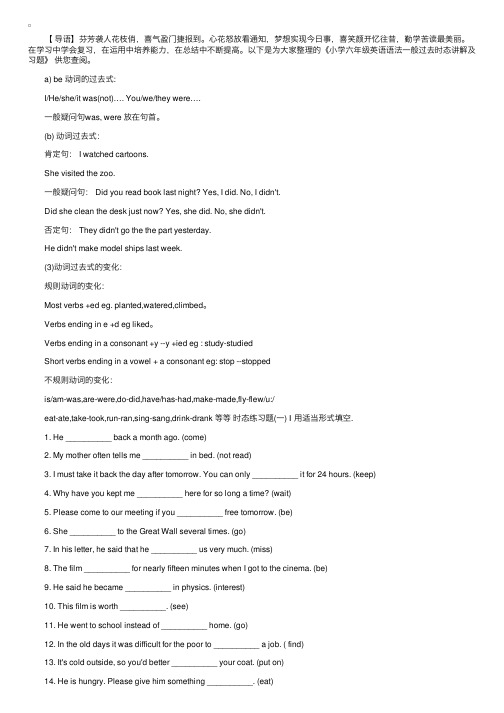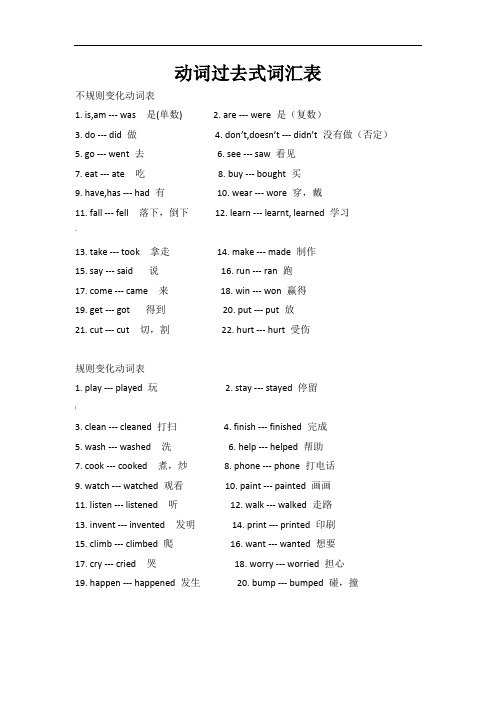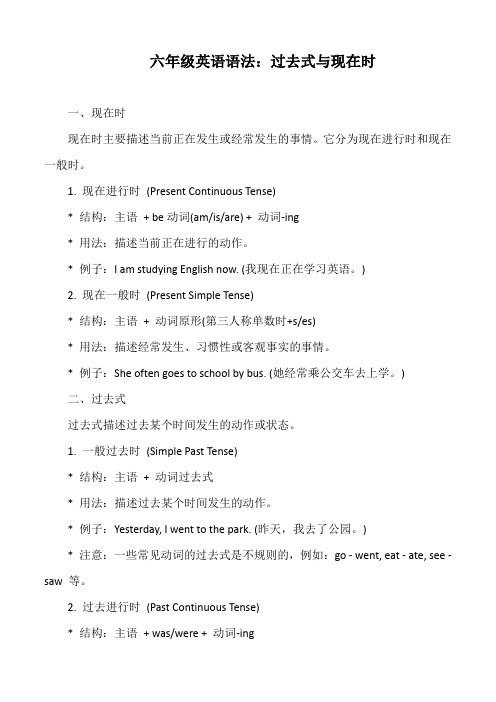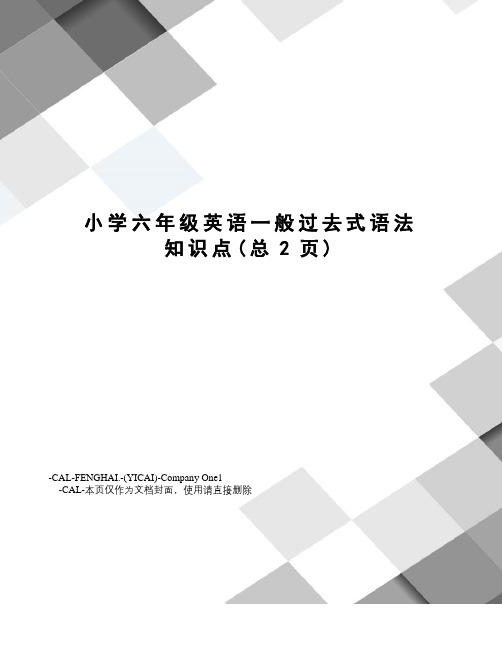六年级英语过去式复习
小学六年级英语复习——过去式

The little boy jumped up and down in the park.(小男孩在公园里跳上跳下。)
walk的过去式是walked,例句
We walked to school instead of taking the bus.(我们步行去学校,没有坐公交车。)
过去进行时
表示在过去某一时刻正在进行的动作或状态。如“We were playing football at that time”(那时我们正在踢足球)中的“were playing”就是过去进行时。
过去完成时
表示在过去某一时间之前已经完成的动作或状态。如“They had finished their homework”(他们已经完成了作业)中的“had finished”就是过去完成时。
行为类动词过去式及例句
listen的过去式是 listen…
I listened to the radio while I was driving.(我开车时听广播。)
read的过去式是read ,例句
He read a book about science last week.(上周他读了一本关于科学的 书。)
一般过去时
表示过去某个时间发生的动作或状 态
过去进行时
表示过去某个时间正在进行的动作 或状态
过去完成时
表示过去某个时间之前已经完成的 动作或状态
过去完成进行时
表示过去某个时间之前一直在进行 的动作或状态
05
小学六年级常见过去式及例句
吃喝类动词过去式及例句
eat的过去式…
I ate a big dinner yesterday.( 我昨天吃了一顿丰盛的晚餐。)
小学六年级英语语法一般过去时态讲解及习题

【导语】芬芳袭⼈花枝俏,喜⽓盈门捷报到。
⼼花怒放看通知,梦想实现今⽇事,喜笑颜开忆往昔,勤学苦读最美丽。
在学习中学会复习,在运⽤中培养能⼒,在总结中不断提⾼。
以下是为⼤家整理的《⼩学六年级英语语法⼀般过去时态讲解及习题》供您查阅。
a) be 动词的过去式: I/He/she/it was(not)…. You/we/they were…. ⼀般疑问句was, were 放在句⾸。
(b) 动词过去式: 肯定句: I watched cartoons. She visited the zoo. ⼀般疑问句: Did you read book last night? Yes, I did. No, I didn't. Did she clean the desk just now? Yes, she did. No, she didn't. 否定句: They didn't go the the part yesterday. He didn't make model ships last week. (3)动词过去式的变化: 规则动词的变化: Most verbs +ed eg. planted,watered,climbed。
Verbs ending in e +d eg liked。
Verbs ending in a consonant +y --y +ied eg : study-studied Short verbs ending in a vowel + a consonant eg: stop --stopped 不规则动词的变化: is/am-was,are-were,do-did,have/has-had,make-made,fly-flew/u:/ eat-ate,take-took,run-ran,sing-sang,drink-drank 等等时态练习题(⼀) Ⅰ⽤适当形式填空. 1. He __________ back a month ago. (come) 2. My mother often tells me __________ in bed. (not read) 3. I must take it back the day after tomorrow. You can only __________ it for 24 hours. (keep) 4. Why have you kept me __________ here for so long a time? (wait) 5. Please come to our meeting if you __________ free tomorrow. (be) 6. She __________ to the Great Wall several times. (go) 7. In his letter, he said that he __________ us very much. (miss) 8. The film __________ for nearly fifteen minutes when I got to the cinema. (be) 9. He said he became __________ in physics. (interest) 10. This film is worth __________. (see) 11. He went to school instead of __________ home. (go) 12. In the old days it was difficult for the poor to __________ a job. ( find) 13. It's cold outside, so you'd better __________ your coat. (put on) 14. He is hungry. Please give him something __________. (eat) 15. Please don't waste time __________ TV every evening. You should word hard at English. (watch) 16. We found the window __________. (break) 17. You have dropped your pencil. __________. (拾起它) 18. Mother often tells me __________ too late. (not come home) 19. You had better __________ by bus, or you will be late. (go) 20. I will __________ Li Ming the good news as soon as I see him.( tell) 21. Great changes __________ in our country since 1978. (take place) 22. I __________ my daughter since last month. (hear from) 23. It __________ me two days to write the article. (took) 24. Don't touch that __________ child. (sleep) 25. Every time he tried to start the car, the wheels __________ deepersintosthe mud. (sink) 26. When I got home, I found that my room __________ breaksintosand a lot of things __________. (steal) 27. If I had arrived there earlier, I __________ him. (meet) 28. I didn't remember __________ her the book before. (give) 29. He called at every door, __________ people the exciting news. (tell) 30. Yesterday Mary couldn't finish her homework, so she has to go on __________ it this afternoon. (do) 时态练习题(⼆) 1. We __________ football when it began to rain. We had to stop and go home. (play) 2. Xiao Lin __________ from here for about two hours. (be away) 3.swheres__________? Can you find your birth place on the map? Sorry, I can't. (be born) 4. Last night we __________ back home until the teacher left school. (not go) 5. Comrade Li Dazhao __________ in prison in 1927. (put) 6. Where is professor Lee? He __________ to the library. He'll come back soon. (go) 7. We could not help __________ after we heard the story. (laugh) 8. Would you please __________ me an English-Chinese dictionary when you come? (bring) 9. He told me that he __________ the Great Wall the year before. (visit) 10. I'll tell him the news as soon as he __________ back. (come) 11. The boy __________ by the door is my brother. (stand) 12. Do you remember __________ the film last year? (see) 13. There __________ a physics test next Monday. (be) 14. __________ I finish my homework in class? (必须) No, you needn't. 15. I'm sorry you've missed the last bus. It __________ ten minutes ago. (leave) 16. Wei Fang is heard __________ English every morning. (hear) 17. John stopped __________ a rest (have) because he __________ for three hours. (work) 18. I'm sorry to have kept you __________. (wait) 19. A new theatre __________ now. (build) 20. The boys __________ basketball on the playground are my classmates. (play) 21. I regretted answering like that, I was sorry __________ so. (do) 22. Can't you see I'm busy __________? (cook) 23. He __________ worried when coming into the teacher's office. (look) 24. __________ come beef! (随便吃点) 25. It's a great shame for me __________ in front of so many people. (laugh at) 26.Look!That man_ (open)the door of your car. 27.T.he moon_ (go)round the earth. 28.I must go now.It_ (get)late. 29.Let's go out.It_ (not/rain)now. 30.Julia is vera good at languages.She_ (speak)four languages very well. 31.Hurry up!Everybody_ (wait)for you. 32."_ (you/listen)to the radio?""No,you can turn it off." 33."_ (you/listen)to the radio?""No,just occasionally. 34.We usually_ (grow)vegetables in our garend but this year we_ (not/grow)any. 35.Ron is in London at the moment.He _ (stay)at the Park Hotel. He _ (always/stay)there when he's in London. 36.Can we stop walking soon?I_ (feel)tired. 37.Can you drive I_ (learn).My father_ (teach)me. ually I (finish)work at 5:00,but this week I (work)until 6:00to earn a bit more money. 39.My parents_ (live)in Bristol.They were bron there and have never lived anywhere else.。
六年级上册英语素材-动词过去式归纳 句型 译林版

u
understand(understood)明白、懂得
w
write(wrote)写wear(wore)穿着
规则动词过去式变化规律:
1.大部分直接在词尾+ ed,如:looked,played,opened
2.以不发音的e结尾的直接+ d,如:liked,lived,danced,skated,closed
d
draw(drew)画画drink(drank)喝drive(drove)开车do(did)做/助动词
e
eat(ate)吃
f
find(found)找到fly(flew)飞fight(fought)打架feel(felt)感觉fall(fell)掉下来
g
give(gave)给get(got)得到grow(grew)生长、种植go(went)去
肯定句
主语+动词原形/动词三单+其他
I have a computer. I live inBeijing.
He/Shehasa computer.
He/ShelivesinBeijing.
主语+动词过去式+其他
I lived inBeijinglast year.
He/She lived inBeijinglast year.
We went to the book shop yesterday.
He/She went to the book shop yesterday.
否定句
(含有not的句子)
主语+do not/don’t+动词原形+其他
Idon’t havea computer.
小学六年级 现在分词 过去式

小学英语现在分词与过去式一、现在分词:1.一般在动词后加—ing(含以“y”结尾的词)。
fly(ing) /cry(ing) /study(ing)/buy(ing)…2.以不发音的字母“e”结尾的动词,去“e”,加-ing:live→living住skate→skating 滑冰have→having有另:【come来become变成arrive到达like喜欢 invite邀请 close关掉 smile微笑welcome 欢迎write 写 shine发光;照耀 take 拿lose丢失,迷路 make 制作slide滑…】3.小学动词双写最后辅音字母,再加—ing的词有:plan→planning 计划let→letting 让get→getting 取、得到forget→forgetting 忘记sit→sitting 坐swim→swimming 游泳begin→beginning 开始 win→winning赢,获胜skip →skipping跳绳 stop→stopping 停止shop→shopping 购物 put→putting 放cut→cutting 切、割run→running 跑步hit→hitting打撞击另:【chat聊天/set 设置 /beg乞求/spit吐痰/ /dig 挖、掘/fit合适 /nod点头/hug拥抱 /shut关闭】二、动词的过去式1.一般在动词后加—ed:walk走路、步行help帮point指、指向 laugh笑 play玩 work工作 comb梳talk说话;交谈reach到达 remember记得look看cook煮饭need 需要 wash洗relax放松 call称呼、叫 answer 回答 ask 问 want 想、想要happen 发生comb 梳ski滑雪pass 传递visit 访问;拜访;参观jump跳蹦跳brush刷thank谢谢show 展示learn学习 open打开 count数unlock 开锁 splash 泼;溅 yell 欢呼bloom 开花……2.以不发音的字母“e”结尾的动词,直接加-d:arrive(d)到达like(d)喜欢 invite(d)邀请 skate(d)溜冰 close(d)关掉live(d)住 smile(d) 微笑 welcome(d) 欢迎3.辅音字母+尾—y,变“y”为“i”加—ed:cry→cried 哭 dry→dried擦干,弄干 study→studied学习4.双写最后辅音字母,再加—ed的词有:plan(ned)计划skip(ped)跳绳stop(ped) 停止shop(ped)购物另:【chat(ted)聊天beg(ged)乞求nod(ded)点头hug(ged)拥抱】5.不规则的动词:get→got 取、得到forget→forgot 忘记win→won赢,获胜 wake→woke醒drive→drove驾驶write →wrote写 shine→shone发光 ride→rode骑车come→came来 become→became 变成sit→sat 坐swim→swam 游泳sing→sang唱;唱歌 drink→drank喝 run→ran跑begin→began 开始 give→gave给drink→drank喝speak→spoke讲说break→broke 打破 stand→stood站立、站 take →took拿buy →bought买 bring→brought带来 think→thought想 teach →taught教 catch→caught抓can→could能、会will→would 将要 keep→kept坚持sweep→swept打扫sleep→slept睡觉throw →threw扔 know→knew知道了解 grow→grew 生长 blow→blew吹draw→drew画fly→flew放飞sell→sold卖tell→told告诉let→let让 put→put 放cut→cut 切、割 hurt→hurt伤,刺痛 hit→hit打撞击cost→ cost花费read→read/red/读feel→felt感觉fall→fell跌倒am/is→was are→were do→did 做go→wen去,走leave→left离开see→saw看见 eat→ate吃 bend →bent 鞠躬 send→sent寄出lie→lay躺 lose→lost丢失,迷路 make →made制作 may →might可以say→said说wear→wore 穿戴 fall→fell 落、跌倒have→had 有 find→found找到 slide →slid滑meet→met遇见 hear→heard听见。
六年级英语一般过去时动词过去式必背知识点

小学六年级英语动词过去式必背知识点规则动词词尾加百度-ed有三种读音:1.在清辅音后读作[t]。
如:asked,helped,watched,stopped2.在浊辅音和元音后读作[d]。
如:enjoyed,studied,moved,called3.在t/d后读作[id]。
如:wanted,needed动词过去式变化形式:规则动词的过去式由“动词原形+-ed”构成,具体变化有:1.直接在词尾加-ed。
如:want—wanted,work—worked,need—needed,clean—cleaned2.以不发音的e结尾的在词尾加-d。
如:like—liked,live—lived,use—used,move—moved3.以一个元音字母加一个辅音字母结尾的重读闭音节动词,先双写结尾的辅音字母,再加-ed。
如:stop—stopped,trip—tripped4.以辅音字母加y结尾的动词,先把y变成i,再加-ed。
如:study—studied,carry—carried, hurry—hurried,marry—married不规则动词的过去式大体上归纳有以下六条记忆法:1.以t结尾的词,过去式与原形相同。
如:put—put,let—let,cut—cut,beat—beat2.以d结尾的词,把d变成t。
如:build—built,lend—lent,send—sent,spend—spent3.以n结尾的词,在词后加t。
如:mean—meant,burn—burnt,learn—learnt4.以ow/aw结尾的词,把ow/aw变成ew。
如:blow—blew,draw—drew,know —knew,grow—grew5.含有双写字母的词,将双写改为单写,在词尾加t。
如:keep—kept,sleep—slept,feel —felt,smell—smelt6.含有元音字母o/i的词,将o/i变成a。
六年级英语动词过去式词汇表

动词过去式词汇表不规则变化动词表1. is,am --- was 是(单数)2. are --- were 是(复数)3. do --- did 做4. don’t,doesn’t --- didn’t 没有做(否定)5. go --- went 去6. see --- saw 看见7. eat --- ate 吃8. buy --- bought 买9. have,has --- had 有10. wear --- wore 穿,戴11. fall --- fell 落下,倒下12. learn --- learnt, learned 学习"13. take --- took 拿走14. make --- made 制作15. say --- said 说16. run --- ran 跑17. come --- came 来18. win --- won 赢得19. get --- got 得到20. put --- put 放21. cut --- cut 切,割22. hurt --- hurt 受伤规则变化动词表1. play --- played 玩2. stay --- stayed 停留{3. clean --- cleaned 打扫4. finish --- finished 完成5. wash --- washed 洗6. help --- helped 帮助7. cook --- cooked 煮,炒8. phone --- phone 打电话9. watch --- watched 观看10. paint --- painted 画画11. listen --- listened 听12. walk --- walked 走路13. invent --- invented 发明14. print --- printed 印刷15. climb --- climbed 爬16. want --- wanted 想要17. cry --- cried 哭18. worry --- worried 担心19. happen --- happened 发生20. bump --- bumped 碰,撞。
全国通用六年级下册英语复习资料不规则动词过去式表

英语不规则动词过去式表A原形过去式中文意思am/is was[wɒz]是are were[wɜː]是awake[əˈweik]awoke[əˈwəʊk]唤醒B原形过去式中文意思become[biˈkʌm]became[bɪˈkeɪm]成为;变成begin[bɪˈgɪn]began [biˈɡæn]开始blow [bləu]blew [blu:]吹,刮break[breik]broke[brəʊk]打坏;打破bring[briŋ]brought[brɔ:t]带来build[bild]built[bilt]建筑;建设burn [bɜ:n]burnt [bɜ:nt]/burned [bɜ:nd]燃烧,烧坏buy[bai]bought[bɔ:t]买C原形过去式中文意思can[kæn]could[kud]能;会catch[kætʃ]caught[kɔ:t]揪住;抓住choose[tʃu:z]chose[tʃəuz]选择come[kʌm]came[keɪm]来cost [kɔst]cost[kɔst]花费cut[kʌt]cut[kʌt]砍;切D原形过去式中文意思deal [di:l]dealt [delt]分配,经营,处理dig [dɪg]dug [dʌg]挖,掘do/does did 做draw [drɔ:]drew [dru:]绘画dream [dri:m]dreamed/dreamt 做梦drink [driŋk]drank[dræŋk]喝drive [draiv]drove[drəʊv]驾驶;开车E原形过去式中文意思eat [i:t]ate [et]/ [eit]吃F原形过去式中文意思fall [fɔ:l]fell [fel]落下;跌倒feed [fi:d]fed[fed]喂养feel [fi:l]felt [felt]感觉fight [fait]fought [fɔ:t]打架find [faind]found [faund]发现;找到fly [flai]flew [flu:]飞行forget [fəˈɡe t]forgot [fəˈɡɔt]忘记forgive [fəˈɡiv]forgave [fəˈɡeiv]原谅,饶恕G原形过去式中文意思get[get]got [gɔt]得到give[gɪv]gave[ɡeiv]给予go went[went]走;去grow[ɡrəʊ]grew[ɡrʊ:]成长;种植H原形过去式中文意思hang[hæŋ]hung[hʌŋ]/hanged[hæŋd]闲晃;悬挂have/has had 有hear[hiə]heard[həːd]听见hide [haɪd]hid [hid]隐藏,躲避hit hit 打;击hold [həuld]held [held]拿,举行hurt[hə:t]hurt[hə:t]伤害IJK原形过去式中文意思keep[ki:p]kept[kept]保持know[nəʊ]knew[nju:]知道;了解L原形过去式中文意思lay [leɪ]laid[leɪd]放置learn[lə:n]learnt[lɜ:nt]/learned ['lɜːnd]学习leave[li:v]left[left]离开;留下lend [lend]lent [lent]借出let[let]let 让lie[laɪ]lay[leɪ]/lied [laɪ]躺下,放下,撒谎lose[lu:z]lost[lɔst]丢失M原形过去式中文意思make[meɪk]made[meɪd]制造;制作may[meɪ]might[maɪt]可以mean[mi:n]meant[ment]意思是;意味着meet[mi:t]met[met]遇见mistake[mɪˈsteɪk]mistook[mɪˈstʊk]犯错must[mʌst]must 必须NOP原形过去式中文意思pay[peɪ]paid[peɪd]付钱;赔偿put[pʊt]put 放, 安置, 使处于QR原形过去式中文意思read[ri:d]read[red]读ride[raɪd]rode[rəʊd]骑;乘ring[rɪŋ]rang[ræŋ](钟/铃)响;鸣rise[raɪz] rose[rəuz]升起run[rʌn]ran[ræn]跑S原形过去式中文意思say[seɪ]said[sed]说see[si:]saw[sɔ:]看见sell [sel]sold[səʊld]卖send[send]sent[sent]寄;送;派set[set]set 安装,布置shake[ʃeɪk]shook[ʃʊk]摇动;摆动shall[ʃæl]should[ʃʊd]应该shine[ʃaɪn]shone[ʃəʊn]/shined[ʃaind]照耀shoot [ʃu:t]shot[ʃɔt]射击show showed 显示shut[ʃʌt]shut 关闭,关掉sing[sɪŋ]sang[sæŋ]唱sit [sɪt]sat[sæt]坐sleep[sli:p]slept[slept]睡smell[smel]smelt[smelt]/smelled [smeld]嗅speak[spi:k]spoke[spəʊk]说spell [spel]spelt[spelt]/spelled [speld]拼读;拼写spend [spend]spent [spent]花费;度过stand [stænd]stood[stʊd]站steal [sti:l]stole [stəʊl]偷stick [stik]stuck [stʌk]刺sweep [swi:p]swept[swept]打扫swim[swɪm]swam[swæm]游泳swing [swɪŋ]swung [swʌŋ]荡T原形过去式中文意思take [teɪk]took[tʊk]带去;花费;乘teach [ti:tʃ]taught[tɔ:t]教tell[tel]told[təʊld]告诉think[θɪŋk]thought[θɔ:t]想;思考throw[θrəu]threw[θru:]扔;投;掷U原形过去式中文意思understand[ˌʌndəˈstænd]understood [ˌʌndəˈstʊd]明白VW原形过去式中文意思wake [weɪk]woke[wəʊk]/waked[weikt]醒wear[wɛə]wore[wɔ:]穿戴will[wɪl]would[wʊd]将;愿win[wɪn]won [wʌn]获胜write [raɪt]wrote[rəʊt]写XY Z。
六年级英语语法 过去式 现在时

六年级英语语法:过去式与现在时一、现在时现在时主要描述当前正在发生或经常发生的事情。
它分为现在进行时和现在一般时。
1. 现在进行时(Present Continuous Tense)* 结构:主语+ be动词(am/is/are) + 动词-ing* 用法:描述当前正在进行的动作。
* 例子:I am studying English now. (我现在正在学习英语。
)2. 现在一般时(Present Simple Tense)* 结构:主语+ 动词原形(第三人称单数时+s/es)* 用法:描述经常发生、习惯性或客观事实的事情。
* 例子:She often goes to school by bus. (她经常乘公交车去上学。
)二、过去式过去式描述过去某个时间发生的动作或状态。
1. 一般过去时(Simple Past Tense)* 结构:主语+ 动词过去式* 用法:描述过去某个时间发生的动作。
* 例子:Yesterday, I went to the park. (昨天,我去了公园。
)* 注意:一些常见动词的过去式是不规则的,例如:go - went, eat - ate, see -saw 等。
2. 过去进行时(Past Continuous Tense)* 结构:主语+ was/were + 动词-ing* 用法:描述过去某个时间正在进行的动作。
* 例子:At 8 o'clock yesterday evening, I was watching TV. (昨天晚上8点,我正在看电视。
)三、练习与比较为了更好地掌握这两种时态,建议进行以下练习:1. 造句练习:使用现在时和过去式分别造几个句子,确保能够正确使用时态。
2. 填空练习:提供一段文字,其中有一些动词需要填入正确的时态形式。
3. 阅读理解:阅读简短的英文段落,识别并标出其中的现在时和过去式动词。
通过对比练习,学生可以更清晰地了解现在时和过去式的区别,从而在实际应用中避免混淆。
六年级英语重点单词过去式

六年级英语重点单词过去式过去式(Past tense)是英语语法中的一个重要概念。
在六年级英语学习中,学生们需要掌握一系列常见动词的过去式形式。
过去式是表示过去发生的动作、事情或状态的形式。
以下将详细介绍几个常见的六年级英语重点单词的过去式形式。
1. go – went"go"意思是“去”。
它的过去式形式是"went"。
例如:I went to the park yesterday.(我昨天去了公园。
)2. eat – ate"eat"意思是“吃”。
它的过去式形式是"ate"。
例如:She ate an apple for breakfast.(她早餐吃了一个苹果。
)3. drink – drank"drink"意思是“喝”。
它的过去式形式是"drank"。
例如:They drank some waterafter playing soccer.(他们踢完足球后喝了些水。
)4. see – saw"see"意思是“看到”。
它的过去式形式是"saw"。
例如:He saw a bird in the tree.(他在树上看到了一只鸟。
)5. do – did"do"意思是“做”。
它的过去式形式是"did"。
例如:We did our homework together.(我们一起做作业。
)6. have – had"have"意思是“有”。
它的过去式形式是"had"。
例如:She had a great time at the party.(她在派对上过得很开心。
)7. make – made"make"意思是“制作”。
它的过去式形式是"made"。
小学六年级英语【动词过去式过去分词】总结

一般过去式构成:表示一般过去式的动词通常用动词的过去式形式来表示,而动词的过去式是在动词原形的基础上变化的。
动词的过去式可分为规则动词和不规则动词。
规则动词的过去式变化如下:1 一般情况下,动词词尾加-ed ,如:worked played wanted acted2 以不发音的-e 结尾动词,动词词尾加-d,如:lived moved decided declined hoped judged raised wiped3 以辅音字母+ y结尾的动词,把-y变为-i 再加-ed,如:studied tried copied justified cried carried embodied emptied4 以一个辅音字母结尾的重读闭音节动词,双写词尾辅音字母,再加-ed,如:stopped begged fretted dragged dropped planned dotted dripped 注:不规则动词的过去式变化规律性不强,须多加记忆。
go - went make - made get - got buy - bought come - came fly-flew英语不规则动词过去式、过去分词表(1)AAA型(动词原形、过去式、过去分词同形)cost(花费)cost--cost cut(割)--cut--cut hit(打)--hit-- hit hurt 伤害)--hurt-- hurtlet(让)--let --let put(放)--put --put read (读)--read-- read(2) AAB型(动词原形与过去式同形)beat(跳动)--beat-- beaten(3) ABA型(动词原形与过去分词同形)become(变成)--became—become come(来)--came --come run(跑)--ran --run (4) ABB型(过去式与过去分词同形)dig(挖)--dug-- dug get(得到)--got-- got hang(吊死)--hanged—hangedhang(悬挂)--hung --hung hold(抓住)--held --held shine(照耀)--shone --shonesit(坐)--sat --sat win (赢)--won --won meet(遇见)--met --metkeep (保持)--kept-- kept sleep(睡)--slept-- slept sweep(扫)--swept-- sweptfeel(感觉)--felt --felt smell(闻)--smelt --smelt leave(离开)--left --leftbuild(建设)--built --built lend(借出)--lent --lent send (传送)--sent-- sentspend(花费)--spent --spent lose (丢失)--lost --lost burn (燃烧)--burnt-- burntlearn(学习)--learnt --learnt mean(意思是)--meant --meant catch(抓住)--caught --caught teach(教)--taught-- taught bring(带来)--brought-- brought fight (战斗)--fought --foughtbuy(买)--bought-- bought think(想)--thought --thought hear (听见)--heard --heard sell(卖)--sold --sold tell(告诉)--told-- told say(说)--said-- saidfind(找到)--found --found have/has(有)--had --had make(制造)--made --made stand(站)--stood --stood understand明白--understood --understood(5) ABC型(动词原形、过去式与过去分词三者不同形)begin(开始)--began-- begun drink(喝)--drank --drunk ring(铃响)--rang-- rungsing (唱)--sang --sung swim(游泳)--swam --swum blow(吹)--blew-- blowndraw(画)--drew --drawn fly(飞)--flew --flown grow(生长)--grew --grownknow(知道)--knew-- known throw(投掷)--threw-- thrown show(出示)--showed --shown break(打破)--broke --broken choose(选择)--chose-- chosen wake(醒)--woke --woke forget(忘记)--forgot-- forgotten (forgot) speak(说,讲)--spoke --spokendrive(驾驶)--drove --driven eat(吃)--ate --eaten fall(落下)--fell-- fallengive(给)--gave-- given rise(升高)--rose --risen take(取)--took --takenmistake(弄错)--mistook-- mistaken ride(骑)--rode --ridden write(写)--wrote-- written do(做)--did --done go(去)--went-- gone lie(平躺)--lay --lainsee(看见)--saw -- seen wear(穿)wore worn be ( am, is, are )(是)--was, were --been。
小学六年级英语复习——过去式

watch TV-watch TV
put on-put on
go to school-go to school
go to bed-gБайду номын сангаас to bed
03
过去式的句式变化
肯定句中的过去式
be 动词的变化
was / were + 动词的过去分词
例句
I was a student last year.
过去式的用法
1
表示过去的某个时间点或时间段内发生的动作 或状态。
2
在句子中作谓语,通常与表示过去的时间状语 连用。
3
有时也可以用于描述过去某个事件或经历。
过去式的时间标记
表示过去的某个时间点
yesterday, last night, three days ago等。
表示过去的某个时间段
last year, during the past few weeks等。
studied, try-tried
以“元音+y”结尾的动词,加-d,例如:buy-bought, play-
03
played
动词过去式的特殊变化
be动词:was/were
01
02
have动词:had
do动词:did
03
04
say动词:said
go动词:went
05
06
see动词:saw
常用的过去式单词和短语
小学六年级英语复习——过去式
xx年xx月xx日
contents
目录
• 过去式的定义和用法 • 过去式的构成 • 过去式的句式变化 • 过去式的情境应用 • 过去式的练习和巩固
小学六年级英语一般过去式语法知识点

1)一般过去时时间标志语long longago(很久以前), one day(有一天),yesterday(昨天), last night(昨晚), three days ago(三天前)。
2)Be动词在一般过去时中的变化:
am和is在一般过去时中变为was。am,is----was
4)过去式“-ed”的发音规则(1)动词词尾为“t,d”时,发/ id /音,want →wanted(要)need →needed(需要)(2)动词词尾为清辅音时,发/ t /音。help →helped(帮助)laugh →laughed(笑)look →looked(看)kiss →kissed(吻)wash →washed(洗)
are在一般过去时中变为were。are-----were
3)动词过去式变化规则:
1.一般在动词末尾加-ed,如:point-pointed,shout-shouted
2.以不发音的e结尾加-d,如:like-liked live-lived
4)过去式“-ed”的发音规则(1)动词词尾为“t,d”时,发/ id /音,want →wanted(要)need →needed(需要)(2)动词词尾为清辅音时,发/ t /音。help →helped(帮助)laugh →laughed(笑)look →looked(看)kiss →kissed(吻)wash →washed(洗)
2)Be动词在一般过去时中的变化:
am和is在一般过去时中变为was。aቤተ መጻሕፍቲ ባይዱ,is----was
are在一般过去时中变为were。are-----were
3)动词过去式变化规则:
1.一般在动词末尾加-ed,如:point-pointed,shout-shouted
- 1、下载文档前请自行甄别文档内容的完整性,平台不提供额外的编辑、内容补充、找答案等附加服务。
- 2、"仅部分预览"的文档,不可在线预览部分如存在完整性等问题,可反馈申请退款(可完整预览的文档不适用该条件!)。
- 3、如文档侵犯您的权益,请联系客服反馈,我们会尽快为您处理(人工客服工作时间:9:00-18:30)。
Beginning开头
Body正文
Ending结尾
Homework
1、写一篇关于你的周末或假日的小作文,不
少于5句话。
Thank you! Goodbye!
江西婺源油菜花 阿根廷--巴西边境的伊瓜苏瀑布 印度的泰姬陵 大别山的野菊花 中国 秘鲁 长城 马丘比丘 南非开普敦 加拿大 落基山脉
澳大利亚大堡礁 埃及金字塔
约旦 佩特拉
Revision The past tense
Let’s chant
Your holiday
bought saw
went
slept rode
Look and say
What did she/he do yesterday?
Talking time:the holidays
Where
When
What Did you…?
How
Where
Where did you go over you holiday?
(问出行地点)
How What When
火眼金睛 Sharp eyes
ate went
washed stayed
had
took
Game time 看谁说得快
动词原形变成动词过去式的规律?
clean(cleaned) like(liked)
wash(washed) live(lived) stop(stopped)
see(saw)
study(studied)
on Saturday afternoon
cleaned his room visited his grandparentson Sunday morning played football watched TV on Sunday afternoon
1、there how you did go (?) How did you go there? _________________________________________ 2、you go did Turpan to (?) Did you go to Turpan? _________________________________________ 3、with did who you go (?) _________________________________________ Who did you go with? 4、by plane there went we (.) We went there by plane. _________________________________________ 5、summer holiday your was how (?) How was your summer holiday? ______________________________________ ___
read(read)
>> Summary 大多搭配表示过去的时间短语,如:
last weekend, yesterday,…. ago, just now,before…
动词过去很好记,一般末尾加ed; →cleaned
如果结尾有个e,紧跟其后接个d; →liked 辅音字母加y,要把y变i; →studied 辅音结尾又重读,双写辅音加ed; →stopped 特殊变化要熟记,需要你去多记忆。 →did/had 读音规则:清读[t],元浊[d], t,d后面读[id] eg: watched cleaned wanted
Xishan Park Cheng'de
…
…
Exercise time >> Summary
1、Iplayed ______(play) football yesterday. 2、He ______(see) a saw film last weekend. 3、 We ______(study) English four years ago. studied 4、 Mike ______(read) a book last night. read 5、John went to the cinema and ____(see) a film. saw
Listening time
What did Zoom do last weekend?
Activities Time washed his schoolbag went to the park on Saturday morning
Zoom
did his homework went fishing
How did you go there?
(问出行交通方式)
What did you do there?
(问所做事情)
When did you go there?
Who
Who did you go with?
(问人物)
(问出行时间)
A:Where did you go last weekend? B: I went to ... A: How did you go there? B: I went there by... A: What did you do? B: I ...
Enjoy the holidays, enjoy the life! 享受假日,享受生活! But you must finish the homework first. 但是必需先完成作业!
ቤተ መጻሕፍቲ ባይዱ
Writing time
My holiday It was a happy holiday. I went to ……with….. I ………………… …………………. …………………. I had a good time on my holiday.
